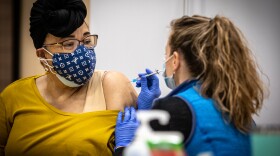The Livingston County Board of Commissioners passed a resolution at its meeting Monday night, criticizing the state's use of the CDC's social vulnerability index in determining COVID-19 vaccine allocation and calling on the state to retract the plan.
The resolution claims that the state's use of the index is disproportionately hurtful to Livingston County seniors. It says that the population at biggest risk of contracting COVID-19, according to experts, is senior citizens, particularly those with underlying health conditions.
The SVI, the resolution argues, does not appropriately account for that risk. One section reads, "had the State of Michigan elected to fairly and objectively and uniformly distribute vaccine based on a county’s population of its most at risk—e.g. its senior citizens—Livingston County should be prioritized as the 11th highest, rather than the lowest or 83rd."
The CDC's index uses Census data to establish a community's social vulnerability. Basically, it measures the community's ability to "prevent human suffering and financial loss in the event of a disaster," like the COVID-19 pandemic.
The 15 factors are divided into four categories: socioeconomic status (below poverty, unemployed, income, no high school diploma), household composition and disability (aged 65 or older, aged 17 or younger, older than age five with a disability, single-parent households), minority status and language (minority, speaks English "less than well"), and housing type and transportation (multi-unit structures, mobile homes, crowding, no vehicle, group quarters).
Wes Nakagiri, chairman of the Livingston County Board of Commissioners, looked at those factors in a presentation he gave during the meeting about the resolution. He went so far as to claim that the state of Michigan was not following the CDC's recommendations for a vaccine rollout.
Some Livingston County residents who spoke during the public comment portions of the meeting were opposed to the resolution, while others were in favor.
Jessica Garcia, from Brighton, was one of the residents opposed to the resolution. She works as a diversity, equity, and inclusion consultant for the University of Michigan and the state of Michigan. Garcia said that if the board would not consider the humanitarian cost of ignoring the index, they should at least consider the economic cost.
"If you’re thinking about our essential workers, and who’s most likely to be in our businesses, working on the frontlines, these are also the folks from marginalized communities. And if they get infected, they can’t come to work. And if too many of them get infected, the business has to shut down," she said. "I ask that you deeply consider the impact of the decision you are making, whether it's from the humanitarian side or the economic side. It is the terrible decision, and as many have mentioned, the optics are not good either."
Commissioner Doug Helzerman said the state should look at the number of deaths and cases in each county and distribute the vaccine using those numbers. He said the social vulnerability index made assumptions that need to be supported by data, and was eager to dispel the notion that the board's opposition to the social vulnerability index was in any way racist.
"It’s kind of like the old question: ‘when did you stop beating your wife?’ That has been posed to our commissioners: 'when are you going to stop being racist?' If you haven’t been racist, you can’t stop being racist. My first boss when I moved to Lansing was a Black man. I had no problem with that. I worked in many manufacturing plants in Livingston County, and I have not seen systemic racism in our plants. Some of my best friends and best workers have been Black. I enjoy working with Black people. I enjoy engaging with Black people in conversation. My granddaughter married a person who had a Black mother. We had no problem with that," he said. "You say when are we going to stop being racist, well, I don’t think I have been racist. And I don’t think this is a racist thing. It is definitely not meant to be that, and I think it’s bad if people construe wrong motives to our commission."
The board passed the resolution with a unanimous vote of 8-0, though Commissioner Kate Lawrence was absent. The resolution was passed with an amendment from Nakagiri who asked the county counsel to "investigate and report to the board by March 1 possible administrative appeals and legal avenues to compel the state of Michigan to protect our most medically vulnerable citizens, by fairly allocating vaccine doses based on proportional vaccine population estimates, and not based on non-medical or social factors."
The new head of the MDHHS, Elizabeth Hertel, says "residents of color, among the elderly, and those in congregant care" have been disproportionately hurt by the pandemic, and says evidence shows more severe outcomes for those populations as well.
"As we work to distribute the vaccine across the state, it makes sense to use the general population as a baseline, and then to also be able to focus on those vulnerable populations to ensure that we're balancing that disproportionality out," she says in defense of the state's use of the SVI.
She also pointed out that the SVI was not the only metric used to make decisions about vaccine allocation, saying, "Some areas do receive more weighting because of where they fall on the vulnerability index, but we do have a baseline to distribute the vaccine based on population density."
Hertel was a guest on Stateside Tuesday. You can listen to her full interview at the top of this article.







